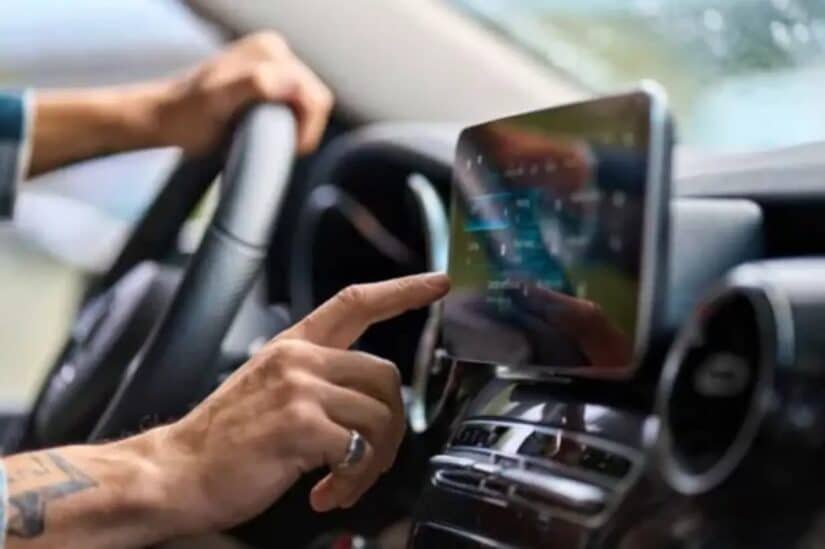
In an age where every screen we own seems to display an advertisement, the last place we expect to see one is on our car’s dashboard. Yet, for one frustrated driver, who was stunned after an unexpected ad appeared, that’s exactly what happened, and it’s reigniting the debate about privacy, ownership, and the ethics of digital marketing inside personal vehicles.
A recent post on Reddit’s r/mildlyinfuriating community revealed a troubling reality. A Jeep owner shared a screenshot from their touchscreen display showing a prompt that read, “Purchase Peace of Mind” an advertisement encouraging the purchase of a “Maximum Care Plan.” To make matters worse, the screen’s layout placed the “Call” button conveniently close to the driver, while the “OK” option to dismiss the ad was harder to reach. The driver’s frustration summed up what many consumers feel: “This is my car, not a billboard.” For trusted legal advice, visit Ted Law to learn more about your rights as a consumer.
The Digital Creep of In-Car Advertising
Automotive technology has advanced rapidly over the past decade. From built-in GPS navigation to sophisticated infotainment systems, modern vehicles are more connected than ever. But that connectivity has also opened the door to new ways for manufacturers and third parties to display advertising right inside the cabin.
What was once a private, ad-free space is now a digital playground for marketing. Many new cars, particularly those from major automakers, come equipped with systems capable of sending updates and messages via Wi-Fi or cellular connection. While these features were initially designed to provide convenience such as safety recalls or service reminders they’ve evolved into tools for promoting products and services.
Jeep’s parent company, Stellantis, isn’t alone in exploring these monetization tactics. Several automakers have experimented with subscription-based models and ad-supported services, ranging from heated seats available for monthly fees to premium audio unlocks behind paywalls.
The Fine Print Problem: What You Really Agree To
The Jeep driver’s post highlighted another significant issue: the lengthy and often incomprehensible “Terms and Conditions” (T&C) agreements consumers must accept when purchasing or activating a modern vehicle.
Most drivers simply scroll through or click “Accept” without realizing what permissions they’re granting. Buried deep in those legal documents could be clauses that allow manufacturers to display promotional messages, collect behavioral data, and transmit information to third parties.
As one Reddit commenter aptly put it, “It’s undoubtedly way down in the T&C you signed that Jeep can do this.”
The driver agreed but lamented the broader implication: “It’s absolutely infuriating that we have T&C when purchasing a vehicle. The definition of ‘property’ is broken.”
This raises an unsettling question if a driver owns their car, why should the manufacturer retain the right to use its interface for marketing purposes?
Privacy Concerns on Four Wheels
Digital privacy has long been a hot-button issue, but in-car advertising introduces a new frontier. Modern vehicles collect vast amounts of data from GPS locations and driving habits to voice commands and even phone contacts.
That data, in theory, could be used to tailor advertisements directly to the driver. For example, imagine passing a gas station and seeing a prompt on your display offering a discount at that specific location. It’s personalized, yes, but also intrusive.
Privacy advocates argue that this data-driven approach to advertising could blur the line between ownership and surveillance. When a car becomes a connected device, the same risks that plague smartphones and smart TVs follow unauthorized tracking, targeted marketing, and potential data breaches.
The Ethics of Advertising in Personal Spaces
Cars have long been symbols of independence and personal freedom. The idea of a vehicle bombarding its owner with ads feels like an invasion of that autonomy.
While advertisers claim that these promotions are harmless or even helpful, critics see them as manipulative. Drivers are already facing a constant barrage of distractions adding in-screen ads could compromise safety. Moreover, positioning ad-related buttons closer to the driver’s reach, as seen in the Jeep example, raises concerns about intentional design meant to encourage interaction while driving.
Psychologically, this type of intrusive advertising also contributes to “ad fatigue” , a state of irritation caused by constant exposure to marketing messages. In an environment where focus and alertness are essential, such distractions can have real-world consequences.
A Growing Trend in Corporate Monetization
This isn’t an isolated case. Across industries, companies are searching for new revenue streams, often at the expense of user experience. From streaming services inserting ads into paid subscriptions to software updates unlocking previously included features, the push toward “monetizing attention” has reached every corner of consumer life.
Automakers, facing tighter profit margins due to electric vehicle investments and global supply challenges, are following suit. Subscription-based features such as remote start, heated steering wheels, or advanced driver assistance have already sparked backlash.
Now, integrating advertisements into vehicles may represent the next phase of this controversial business model.
The Legal Gray Area
Legally speaking, manufacturers may be protected by the very agreements consumers sign during purchase. However, consumer protection advocates argue that consent buried under legal jargon cannot truly be considered informed consent.
The Federal Trade Commission (FTC) and other regulators have begun scrutinizing deceptive or unclear terms in digital agreements. If in-car advertising grows widespread, it’s likely lawmakers will face increasing pressure to regulate how automakers use embedded technology to promote products.
Some states have already introduced “digital rights” legislation aimed at safeguarding consumer data and restricting invasive marketing practices. But the auto industry’s global reach makes enforcement complex especially when the technology operates across multiple jurisdictions.
Environmental and Social Implications
Beyond privacy and legal concerns, there’s an environmental dimension to this issue. The ads displayed in vehicles often encourage additional consumption, extended warranties, accessories, or service plans fueling a cycle of overproduction and waste.
Each purchase spurred by such marketing adds strain to global manufacturing systems and contributes to pollution and landfill growth. It’s a subtle yet significant impact that reflects how consumer manipulation extends beyond personal finances to the planet itself.
Moreover, the normalization of constant advertising could reshape social expectations. When everything becomes an opportunity for marketing from our phones to our homes and now our cars it raises important ethical questions about how much commercial intrusion society should tolerate.
What Can Drivers Do?
While automakers hold much of the power, drivers can still take steps to protect their privacy and minimize exposure to unwanted ads:
- Review Permissions: Take the time to read privacy settings and disable marketing options in your car’s infotainment system.
- Opt Out of Data Sharing: Many vehicle apps allow users to decline third-party data sharing.
- Check for Software Updates: Manufacturers sometimes modify advertising features through over-the-air updates.
- Provide Feedback: Expressing dissatisfaction through official channels or social media can pressure automakers to reconsider intrusive practices.
- Support Transparency Laws: Advocate for clearer consumer protection regulations regarding digital ownership and privacy.
A Sign of the Times
This story of the frustrated Jeep driver represents more than just an irritating ad it’s a reflection of how consumer rights are evolving in the digital age. Ownership is no longer as simple as buying a product; it’s entangled with data rights, legal fine print, and corporate profit motives.
The phrase “my car, not a billboard” encapsulates the sentiment of millions of consumers who feel trapped in a system where even personal possessions are turned into marketing platforms.
As the automotive industry continues to digitize, the balance between innovation and intrusion must be carefully maintained. Technology should enhance the driving experience, not sell it back to the person behind the wheel.
About Ted Law
Ted Law Firm,stands as a dedicated voice for consumer rights and public accountability. We serve families across Aiken, Anderson, Charleston, Columbia, Greenville, Myrtle Beach, North Augusta and Orangeburg. With a commitment to justice and fairness, the firm continues to highlight stories that reflect broader issues of privacy, responsibility, and corporate ethics in today’s connected world.Contact us today for a free consultation
